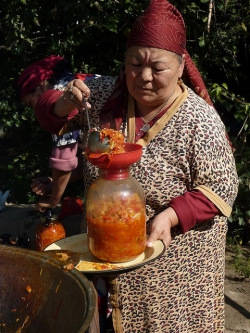Why are so many older women and men going hungry?
Older people are key producers and providers of food. Both older women and men work on the land. A high proportion of small farmers in developing countries are older people.
In Jamaica, the average age of farmers is over 55. In Mozambique more than two-thirds of Small Farmers Union members are over 50.
Women are usually the main providers of food in the household and this role does not stop in old age. Indeed, more and more older women are responsible for feeding grandchildren whose parents have migrated or, particularly in areas affected by HIV and AIDS, are sick or have died.
The struggle for food
But the reality in many countries of the world is that older women and men have a daily and debilitating struggle for regular, decent and nutritious food. Of the some 925 million reported hungry people in 2010, perhaps a fifth of this number will be over 60 years of age.
As population proportions change around the world, failure to act on hunger in old age will be dramatic. By 2045, there will be more people over 55 than children under 15. Countries such as China, Brazil, Korea, India and Mexico are already experiencing this very rapid transition from young to old with hunger in old age in both rural and urban a key concern.
In the USA, The American Assocation of Retired Persons (AARP) has just launched a ‘new drive to end hunger’ in response to the doubling of food insecurity of the older population there.
The truth behind the hunger
The reasons for older people going hungry are many, as our latest edition of Ageways illustrates.
Living arrangements, reduced mobility, insecure land tenure, declining capacity to farm, the demands of caring, insufficient income and environmental degradation of already poor farmland are some of the reasons.
Older women and men often bear the brunt of shortages because they give their share to younger family members. A 2008 study in the USA, showed that older people living with a grandchild were 50% more likely to go hungry than the child.
Food price hikes
In Sri Lanka, where the price of milk powder almost tripled in February 2009, a study by HelpAge Sri Lanka showed that older people went without, so that children in their care did not.
As global prices of wheat and corn, and staples such as flour, bread and oil, rise we know that food price hikes will affect older people with low incomes with small children to feed. Already we have examples from Kyrgyzstan, where older people can spend their entire pension on flour to make bread.
Food security
Food security was a central theme of the Millennium Development Goals (MDG) summit in 2010. UN member states reaffirmed their commitment to halving extreme poverty and hunger and recognising the right of everyone to have access to safe, sufficient and nutritious food.
The 2002 Madrid Plan of Action on Ageing makes an explicit recommendation to member states to take action on hunger and food insecurity in older age.
The recent European Commission green paper on EU development policy in support of inclusive growth and sustainable development emphasises investment in the agricultural sector, including small holder farmers, as a means of driving economic growth in developing countries.
As preparations begin for the 20 year review of the World Summit on Sustainable Development in Rio in May 2012, can we be sure that issues of ensuring food security for all people, of all ages, older small holder farmers too, will be on the agenda?
Global action to eradicate older people’s hunger
This issue of Ageways does not only look at the problems but through examples shows us how older people and those that support them are taking initiatives to improve their situation.
From simple solutions such as covered water tanks, support to irrigate community gardens, lunch clubs and “meals on wheels”, there are examples that give older people their only chance of a decent meal.
Many are run by volunteers, often older people themselves. In this issue of Ageways we pay tribute to their vital work, and call for global action at all levels to take action now to eradicate older people’s hunger.
